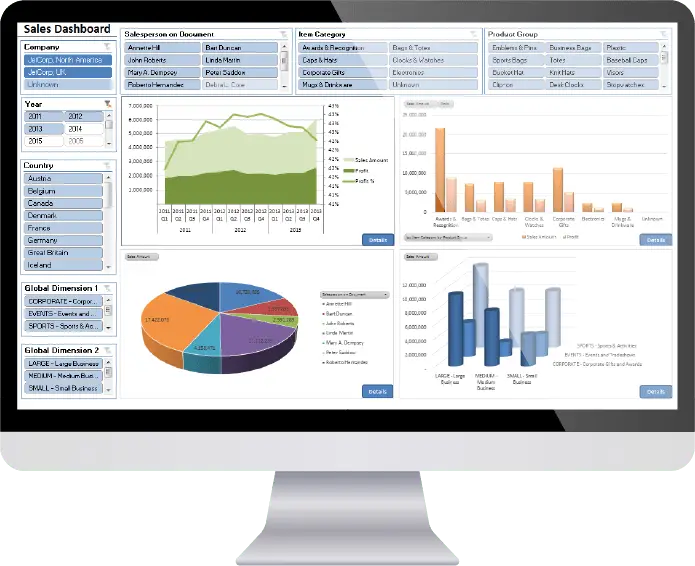How to Optimize Your ERP Reporting?
Optimize Your ERP Reporting

- Global Data 365
According to a recent study, nearly 81% of companies surveyed reported that they had either introduced the use of ERP software or were in the process of implementing it. So, what makes ERP reporting important? By leveraging ERP data analysis, businesses can create strategic plans, forecast future trends, and develop advanced strategies. To truly maximize these benefits, it’s essential to optimize your ERP reporting for more accurate insights and decision-making.
A depth of data indicates that financial reporting generates as much clarification as it creates confusion:
97% of CFO’s have uncertainty regarding the quality of reporting.
- 40% of CFO’s are concerned that information is reliable and precise.
- 87% of accountants function overtime to complete the financial closing.
- 86% of finance teams say that their analytics are not informative.
The only downside is that companies cannot be successful if they don’t have reliable, accurate, and detailed ERP reporting, which can lead to them making risky choices without even acknowledging it. The plus side is that optimizing ERP reporting is not a difficult task in comparison to the usual reporting process.
Listed below are the 5 ways businesses can optimize their ERP Reporting to make it quick and easy:
- Self-Service Reporting
Users often need to submit a request to IT before getting access to a report and wait in a queue until they can access it. Users must depend on technical experts because working with the underlying data is hard. For users who are not IT experts, self-service ERP reporting is intended to be user-friendly. This kind of reporting is less about the careful organization of data and more about being cost-effective and a time saver.
For instance, IKEA, one of the biggest retail company has enabled self-service ERP reporting after the implementation of Jet Reports and witnessed instant results. A report that may have taken hours for a warehouse manager can now be done within seconds. Time is saved by enabling self-sufficient ERP reporting.
- Automated Processes
A large-scale data organization effort is required to report on finance and operations throughout different departments. The workload includes tracking information from different sources, transferring it from one document to another, and putting time and effort to arrange it all in one clear performance portrait. Advanced automated processes speed up this effort by automatically placing data from ERP systems and other networks, then placing it for immediate analysis into pre-built ERP report templates.
Amref Health Africa, a major NGO in Africa, was having difficulty handling data manually before adding Jet Reports to its reporting toolbox. Now the organization spends less time on handling information and reporting.
- Flexibility
Reporting is a regular duty that changes with time. Depending on the same reports adds up to poor performance management, but it takes extra time and feedback from IT experts to produce customized reports. ERP reporting stops being a hassle when it is simple to track various metrics, rewrite reporting data, receive deep insight from reports into transferable data, and access real-time updates on request.
Using an ERP reporting tool, companies can keep track of their data in real-time. Fawaz Holding seized the benefit of customized reports when it introduced Jet Reports to operate side by side with its Microsoft Dynamics 365 Business Central ERP. By building flexibility into the processes, ERP reporting becomes easier.
- Business Continuation
Accurate ERP reporting is vital after the global pandemic. Decision-makers instantly require quality, updated data, but it can also be made inaccessible by the same situation that makes it essential. ERP reporting should function at any time, providing the same robust functionality even though users are operating from elsewhere.
Similarly, Enova Facilities Management started to save time on ERP reporting using Jet Reports. When COVID-19 struck, the business utilized those time saved. The challenge didn’t sway the method of reporting, instead, it provided leaders greater insight into the situation.
- Higher Standards
ERP reporting can be difficult when the processes are not automated. It leads to a lot of time and effort spent on manually documenting reports and generating analysis. Many ERP reporting systems allow the users data security. It is important to set high standards for data reporting, so businesses need to implement robust ERP systems to automate processes and receive greater insight into the workings of all departments.
Air Trade Centre, a Turkish electronics firm felt it needed quicker ERP reporting and relied on Jet Analytics as the solution. After that, reporting then demanded 60% less feedback overall, which reduced the time it took IT on reporting.
In Conclusion
Learn How to Optimize Your ERP Reporting as accurate reporting is a result of quality data, which is precisely the reason the process takes time. Data is an unruly commodity that takes an extra effort to control, protect, and manipulate. As the data volume grows, ERP reporting will fall behind and cause companies to delay acting. That is why it is important to search for strategies that make data as quickly available as possible by automation.
So, if you face any challenges in reporting, our experienced consultants can provide you with solutions to help you optimize your ERP reporting and make your business grow. Schedule a call to discuss your requirements. Contact us now.
Get a Free JET Demo Now!
Search Blog
Related Resources

Migration to Business Central: 7 Essential Tips

Migrating from On-Premise ERP to Microsoft Dynamics 365




Pingback: Importance of Financial Reporting in Business Growth - Global Data 365